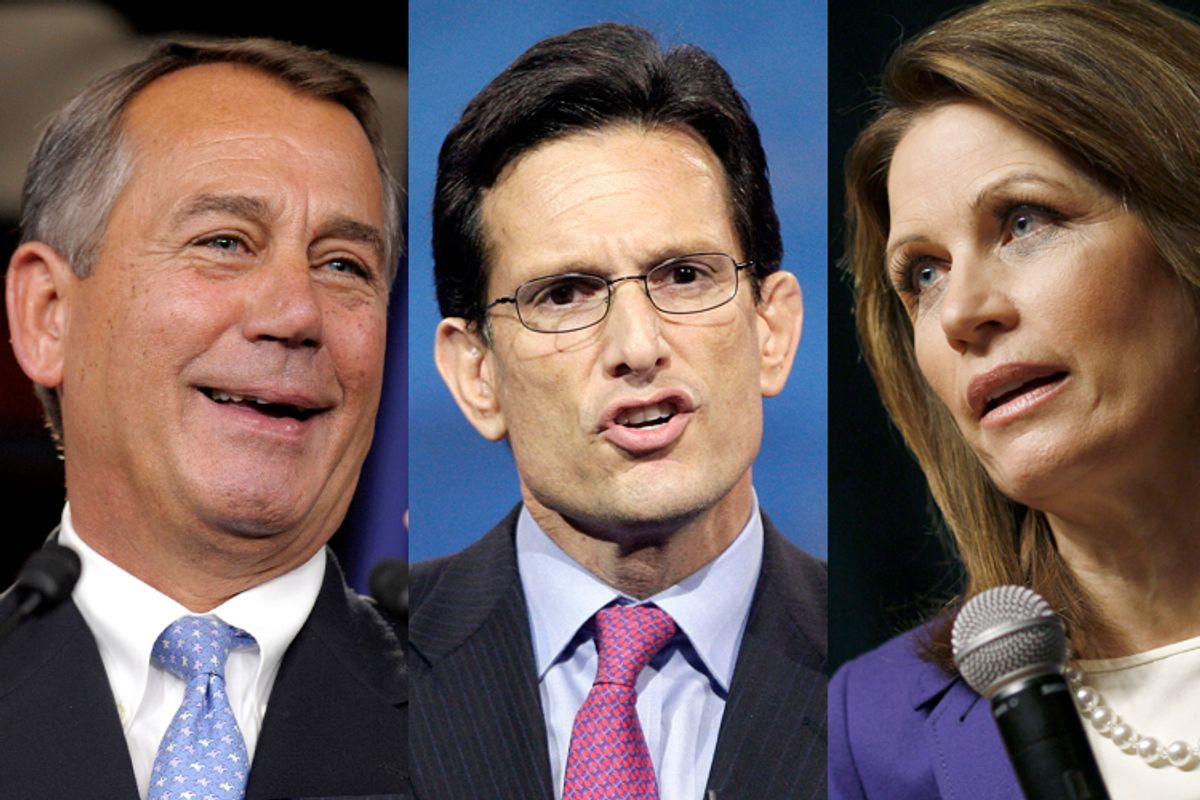Many analysts have compared the lopsided blame Republicans took for the 1995-96 government shutdown to today’s debacle and concluded that the public is more evenly split over who's to blame this time around. Beyond the fact that hemorrhoids are polling better than Congress these days, here are five other data points that suggest the shutdown will have much bigger electoral consequences for the Republican Party:
1. Republican support lags across multiple voting groups. Though negatives are soaring for both Republicans (70 percent) and Democrats (61 percent), according to the latest ABC/Washington Post poll, the GOP is alienating a wider swath of voters.
When comparing the Oct. 7 and Sept. 30 ABC polls, the 7-point increase in Congressional Republicans' negatives is fueled by higher disapproval among almost every group: Republicans (up 7 points), Democrats (up 9 points), Independents (up 5 points), moderates (up 7 points).
Democrats’ overall disapproval ratings also rose by five points, but that increase is driven solely by Republican voters. As ABC noted, “the Democrats, by contrast, receive an additional nine points of disapproval among Republicans compared with last week, but with essentially no change among independents or Democrats.”
In other words, Republicans just hate the Democrats considerably more while nearly everyone increasingly dislikes the Republicans.
2. Fissures in the once bulletproof House majority. A poll of 24 GOP-held Congressional districts in the wake of the shutdown shows generic Democratic candidates besting their GOP counterparts in 17 of the districts — the magic number needed for Democrats to retake the House in 2014. Dig a little deeper and you’ll find that every Democratic challenger gained points after voters learned that their Republican incumbent supported the shutdown, while only six of the GOP incumbents gained points for their stance. In fact, four more districts switched hands in the poll once voters were told their GOP representative supported the shutdown.
The PPP poll commissioned by MoveOn.org Political Action got a boost when New York Times columnist Paul Krugman featured a review of the poll by Princeton colleague Sam Wang that concluded: “If the election were held today, Democrats would pick up around 30 seats, giving them control of the chamber. I do not expect this to happen. Many things will happen in the coming 12 months, and the current crisis might be a distant memory. But at this point I do expect Democrats to pick up seats next year, an exception to the midterm rule.”
PPP put it best: “The surveys challenge the conventional wisdom that gerrymandering has put the House out of reach for Democrats.”
3. Virginia: A sign of the times. If you’re unconvinced by the MoveOn poll, take a look at Virginia, were Democrat Terry McAuliffe has suddenly sprung nine points ahead of Republican Ken Cuccinelli in the race for Virginia governor.
Both candidates have denounced the shutdown and both suffer from unusually high unfavorable ratings (McAuliffe 49 percent, Cuccinelli 56 percent). But the shutdown seems to be sticking to Cuccinelli.
Politico reports: “The major curve ball in the Virginia race, however, is the government shutdown, which is now entering its second week and could be expected to have an outsized impact in a state with such a large population of both civilian and military government employees.”
The poll, a joint effort by the left-leaning firm PPP and right-leaning Harper Polling, found that 62 percent of Virginia voters oppose shutting down the government “over funding for the Affordable Care Act, also known as Obamacare.”
4. Americans are feeling more pain than in ‘96. Nearly half of Americans (48 percent) say they are “very” concerned about the shutdown and another 29 percent are “somewhat” concerned, according to Pew Research Center.
While those who are “very” concerned registered highest among Democrats (59 percent), lower among Republicans (39 percent) and lowest among Tea Partiers (25 percent), 45 percent of the highly coveted Independent voting bloc was very concerned and another 28 percent was somewhat concerned.
Pew also found that voters have been more affected by this shutdown than they were in ‘96. Overall, 28 percent said that they or a member of their family had been “personally inconvenienced,” compared to only 16 percent who said that in January 1996.
5. Tea Party support steadily declining. The Tea Party has inspired conflicting reports of late; some say the Obamacare battle has “re-energized” activists, while Gallup found its popularity at a “near-record low” in September.
The best polling about voters’ views of the Tea Party will be forthcoming once the government shutdown has ended. But let's take a look at what happened last time the Tea Party threatened to torpedo the U.S. economy — the July 2011 debt-ceiling debate. An NYT/CBS News poll found that the party's unfavorable ratings had skyrocketed from 18 percent in April 2010 to 40 percent in August 2011. That same month, Pew found that 30 percent of voters believed Republican leaders were paying too much attention to the Tea Party. Those numbers have also risen since. Today 35 percent of voters believe Tea Partiers are wielding too much power in the GOP while just 26 percent say the Tea Party is getting too little attention.
Gallup’s September poll found that people who oppose the Tea Party now outnumber those who support it by 27 percent to 22 percent (a flip since its high point in November 2010 when more voters supported than opposed the Tea Party, 32 percent to 30 percent). But in that tracking poll, opposition to the Tea Party has remained relatively steady since the beginning of 2012.
Let’s see what Americans think following the shutdown or, worse yet, a default on the national debt.

Shares